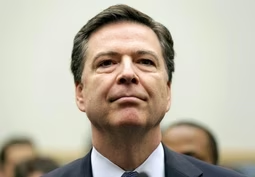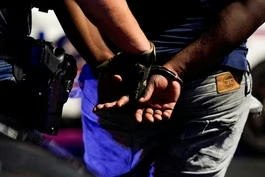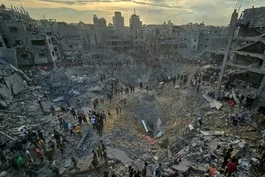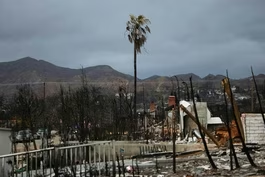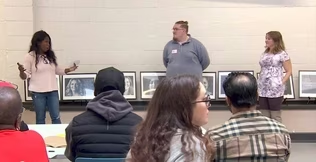
'What We Can Know' depicts a world ravaged by climate change
Clip: 10/8/2025 | 6m 12sVideo has Closed Captions
Ian McEwan's 'What We Can Know' depicts life in a world ravaged by climate change
Imagine the impact of climate change is irreversible, and decades of flooding, famine, pandemics and war have upended life on earth. That world is explored in Ian McEwan's new novel, “What We Can Know.” Senior arts correspondent Jeffrey Brown sat down with the Booker Prize-winning novelist for our arts and culture series, CANVAS.
Problems playing video? | Closed Captioning Feedback
Problems playing video? | Closed Captioning Feedback
Major corporate funding for the PBS News Hour is provided by BDO, BNSF, Consumer Cellular, American Cruise Lines, and Raymond James. Funding for the PBS NewsHour Weekend is provided by...

'What We Can Know' depicts a world ravaged by climate change
Clip: 10/8/2025 | 6m 12sVideo has Closed Captions
Imagine the impact of climate change is irreversible, and decades of flooding, famine, pandemics and war have upended life on earth. That world is explored in Ian McEwan's new novel, “What We Can Know.” Senior arts correspondent Jeffrey Brown sat down with the Booker Prize-winning novelist for our arts and culture series, CANVAS.
Problems playing video? | Closed Captioning Feedback
How to Watch PBS News Hour
PBS News Hour is available to stream on pbs.org and the free PBS App, available on iPhone, Apple TV, Android TV, Android smartphones, Amazon Fire TV, Amazon Fire Tablet, Roku, Samsung Smart TV, and Vizio.
Providing Support for PBS.org
Learn Moreabout PBS online sponsorshipAMNA NAWAZ: Imagine that, by the mid-21st century, the impact of climate change is irreversible, and decades of flooding, famine, pandemics, and war have upended life on Earth.
But rather than dwell on the catastrophe itself, the novel "What We Can Know" brings to life characters on either side of it, their loves, their betrayals, even crimes, with the future looking back at us.
Senior arts correspondent Jeffrey Brown met out with Booker Prize-winning novelist Ian McEwan for our arts and culture series, Canvas.
IAN MCEWAN, Author, "What We Can Know": I'm trying to get in the reader's mind the past and the future and the present into some kind of mix, kind of timeless sense that you can get your mind around all three together.
JEFFREY BROWN: To do that, British novelist Ian McEwan has imagined a future Britain, now a chain of islands after mass flooding, its population halved.
But life, though diminished, goes on.
And a literature professor is obsessed with a mystery: What happened to a famous poem written and then lost in our time?
IAN MCEWAN: I have read quite a lot of science fiction over the years, and I wanted to write a science fiction with no science.
JEFFREY BROWN: Science fiction without the science.
IAN MCEWAN: Without the science.
JEFFREY BROWN: Meaning what?
IAN MCEWAN: Meaning, what's the history?
What's the future of history or the humanities or the future of love, for example, or the daily life that I -- I don't want people getting in and out of spaceships.
JEFFREY BROWN: This is the 19th novel by McEwan, one of his generation's most acclaimed writers.
"Amsterdam" won the 1998 Booker Prize.
"Atonement," perhaps his best known, as well as "Chesil Beach" and "The Children Act," have been made into films.
ACTOR: Let me help with that.
ACTRESS: I'm all right, thanks.
ACTOR: You take the flowers.
ACTRESS: I'm all right.
ACTOR: Take the flowers.
ACTRESS: I'm all right!
JEFFREY BROWN: When we met in New York recently, he told me he'd wondered how a writer like himself, working in the realist tradition, could tackle a subject as big as climate change.
IAN MCEWAN: That tradition we work in, it's about interpersonal relationships.
It's very good on that, the beginnings of love, the end of love... JEFFREY BROWN: Right.
IAN MCEWAN: ... the daily thinginess of -- the banality of daily life.
Climate change is a sort of colossal subject, existential, statistical, oceanography, glaciology.
Is the realist novel up to it?
Can it do it?
JEFFREY BROWN: And that was a question for you?
IAN MCEWAN: That's the question for me.
And my answer is yes, because you can't write about this subject without writing about people.
JEFFREY BROWN: What can we know about the future?
IAN MCEWAN: Yes.
JEFFREY BROWN: And what can we know about ourselves?
IAN MCEWAN: About ourselves, about those nearest to us, and what we know about our society and trying to tell us the right story.
JEFFREY BROWN: This is not a climate change novel, McEwan insists, but it's there as background, the impact and our denial, what's called by later generations the Derangement.
Another inspiration from McEwan, an actual poem by John Fuller, a contemporary English poet, a type of long sonnet sequence called a corona.
McEwan's fictional poet, Francis Blundy, writes and recites a corona for his wife, Vivien, at a gathering of friends, each of whom recalls it and the evening differently.
The poem itself is never seen or read again, but gains a kind of mythical renown through the decades to come.
Now, that's where you had me kind of laughing, is... IAN MCEWAN: Oh, really?
JEFFREY BROWN: Yes, well, after all this, after all these disasters, your main character is a literary scholar who's interested in a poem, of all things.
IAN MCEWAN: Yes.
Well, I think poetry is our highest form of literary expression.
It precedes the novel by 2,000 or 3,000 years, at least.
So, anyway, I couldn't have a guy read a novel at dinner, but more than that, yes, things will survive.
JEFFREY BROWN: What survives and why, why did that interest you?
IAN MCEWAN: Well, you often hear people say history will be the judge, and my point here is history will be as fallible as the present in what it judges, because it's got its own worries and fantasies of the future and aspirations.
JEFFREY BROWN: In the novel, people 100 years from now look back at our lives with a mix of envy at the sheer vibrancy of global life compared to their own shrunken world, and bewilderment and anger at how it was allowed to be lost.
The novel's author worries that, as the impacts of climate change hit more and more, we are falling into what he calls a metaphysical gloom so profound we won't act before it's too late.
IAN MCEWAN: This one thought, that my children or grandchildren won't have as good a life as me, and I hear it a lot in connection to climate change, and I think we stand on the edge of a portal, a gateway.
If we pass through it, we will start to lose hope in any idea of human progress.
And the future looks back to that moment before we pass through that gateway, another advantage of looking back on us from a long angle.
JEFFREY BROWN: But it occurred to me with your title, "What We Can Know," isn't that the question for a novelist always?
IAN MCEWAN: Always, yes.
JEFFREY BROWN: Yes.
IAN MCEWAN: In real life, we don't have access to minds.
We'd love it, of course.
The realist novel does this completely unreal thing of stepping into nine minds around this table, listening to the 10th person read.
And there's a limit of what we can know.
There's a trick that the novelist can perform, allow you this access.
And my sense of that is, that's why the novel, such a frail form, really, has not died.
JEFFREY BROWN: So the novel still has value?
IAN MCEWAN: It has.
I think it's essential.
But, then, of course, I'm bound to say that.
JEFFREY BROWN: OK.The book is "What We Can Know."
Ian McEwan, thank you very much.
IAN MCEWAN: My pleasure, Jeff.
Airports face delays as shutdown deepens ATC staffing woes
Video has Closed Captions
Clip: 10/8/2025 | 6m 38s | Airports face delays as shutdown deepens air traffic control staffing woes (6m 38s)
A Brief But Spectacular take on inclusive communities
Video has Closed Captions
Clip: 10/8/2025 | 3m 18s | A Brief But Spectacular take on building inclusive communities (3m 18s)
Comey pleads not guilty on charges he lied to Congress
Video has Closed Captions
Clip: 10/8/2025 | 4m 55s | Comey pleads not guilty in case his lawyers say is politically motivated (4m 55s)
ICE detains man married to U.S. citizen
Video has Closed Captions
Clip: 10/8/2025 | 6m 55s | 'My husband is not a threat': ICE detains man married to U.S. citizen (6m 55s)
Israel, Hamas agree to first phase of deal to end Gaza war
Video has Closed Captions
Clip: 10/8/2025 | 4m 23s | Israel and Hamas agree to first phase of deal to end Gaza war (4m 23s)
News Wrap: Man charged with starting Pacific Palisades fire
Video has Closed Captions
Clip: 10/8/2025 | 6m 53s | News Wrap: Man accused of starting Pacific Palisades fire arrested (6m 53s)
Palestinians in Gaza share stories of loss and suffering
Video has Closed Captions
Clip: 10/8/2025 | 8m 34s | Palestinians in Gaza share stories of loss and suffering after 2 years of war (8m 34s)
Wisconsin group draws conservatives into unity efforts
Video has Closed Captions
Clip: 10/8/2025 | 8m 35s | Wisconsin group defies trend by drawing more conservatives into bridge-building efforts (8m 35s)
Providing Support for PBS.org
Learn Moreabout PBS online sponsorship
- News and Public Affairs

FRONTLINE is investigative journalism that questions, explains and changes our world.

- News and Public Affairs

Amanpour and Company features conversations with leaders and decision makers.












Support for PBS provided by:
Major corporate funding for the PBS News Hour is provided by BDO, BNSF, Consumer Cellular, American Cruise Lines, and Raymond James. Funding for the PBS NewsHour Weekend is provided by...


